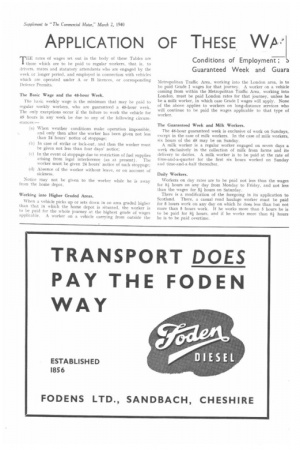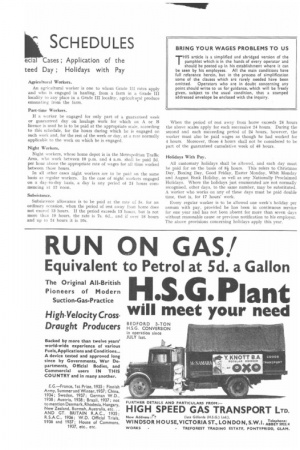APPLICATION OF THESE Wis.'
Page 64

Page 65

If you've noticed an error in this article please click here to report it so we can fix it.
SCHEDULES
Conditions of Employment ; s Guaranteed Week and Guara ecia Cases ; Application of the teed Day ; Holidays with Pay T" rates of wages set out in the body of these Tables are those which are to be paid to regular workers, that is, to drivers, mates and statutory attendants who are engaged by the week or longer period, and employed in connection with vehicles which are operated under A or B licences, or corresponding Defence Permits.
The Basic Wage and the 48-hour Week.
The basic weekly wage is the minimum that may be paid to regular weekly workers, who are guaranteed a 48-hour week. The only exceptions occur if the failure to work the vehicle for 48 hours in any week be due to any of the following circumstances:— (a) When weather conditions make operation impossible, and only then after the worker has been given not less than 24 hours' notice of stoppage: (b) In case of strike or lock-out, and then the worker must he given not less than four days' notice; (c) In the event of stoppage due to restriction of fuel supplies arising from legal interference (as at present). The worker must be given 24 hours' notice of such stoppage; (d) Absence of the worker without leave, or on account of sickness.
Notice may not be given to the worker while he is away from the home depot.
Working into Higher Graded Areas.
When a vehicle picks up or sets down in an area graded higher than that in which the home depot is situated, the worker is to be paid for the whole journey at the highest grade of wages applicable. A worker on a vehicle carrying from outside the
Metropolitan Traffic Area, working into the London area, is to be paid Grade I wages for that journey. A worker on a vehicle coming from within the Metropolitan Traffic Area, working into London, must be paid London rates for that journey, unless he be a milk worker, in which case Grade I wages will apply. None of the above applies to workers on long-distance services who will continue to be paid the wages applicable to that type of worker.
The Guaranteed Week and Milk Workers.
The 48-hour guaranteed week is exclusive of work on Sundays, except in the case of milk workers. In the case of milk workers, six hours of the 48 may be on Sunday.
A milk worker is a regular worker engaged on seven days a eek ekclusively in the collection of milk from farms and its delivery to dairies, A milk worker is to be paid at the rate of time-and-a-quarter for the first six hours worked on Sunday and time-and-a-half thereafter,
Daily Workers.
Workers on day rates are to be paid not less than the wages for 84 hours on any day from Monday to Friday, and not less than the wages for 54 hours on Saturday.
There is a modification of the foregoing in its application to Scotland. There, a casual road haulage worker must be paid for 5 hours work on any day on which he does less than but not more than 5 hours work. If he works more than 5 hours he is to be paid for 84 hours, and if he works more than 84 hours he is to be paid overtime. Agricit itt tral Workers.
An agricultural worker is one to whom Grade HI rates apply and who is engaged in hauling, from a farm in a Grade III locality to any place in a Grade III locality, agricultural produce emanating from the farm.
Part-time Workers.
If a worker be engaged for only part of a guaranteed week or guaranteed day on haulage work for which an A or B licence is used he is to be paid at the appropriate scale, according to this schedule, for the hours during which he is engaged on such work and, for the rest of the week or day, at a rate normally applicable to the work on which he is engaged.
Night Workers.
Night workers, whose home depot is in the Metropolitan Traffic Area, who work between 10 p.m. and 4 a.m. shall be paid 2d. per hour above the appropriate rate of wages for all time worked between those hours.
In all other cases night workers are to be paid on the same basis as regular workers. In the case of night workers engaged on a day-to-day basis, a day is any period of 24 hours commencing at 12 noon.
Subsistence.
Subsistence allowance is to be paid at the rate of Sc. for an ordinary occasion, when the period of rest away from home does not exceed 13 hours. If the period exceeds 13 hours. but is not more than 18 hours, the rate is 7s. 6d., and if over 18 hours and up to 24 hours it is 10s.
When the period of rest away from home exceeds 24 hours the above scales apply for each successive 24 hours. During the second and each succeeding period of 24 hours, however, the worker must also be paid wages as though he had worked for 4 hours. Moreover, those 4 hours shall not be considered to be part of the guaranteed cumulative week of 48 hours.
Holidays With Pay.
All customary holidays shall be allowed, and each clay must be paid for on the basis of 8/ hours. This refers to Christmas Day, Boxing Day, Good Friday, Easter Monday, Whit Monday and August Bank Holiday. as well as any Nationally Proclaimed Holidays. Where the holidays just enumerated are not normally recognised, other days, to the same number, may be substituted. A worker who works on any of these days must be paid double time, that is, for 17 hours' work,
Every regular worker is to be allowed one week's holiday per annum with pay, provided he has been in continuous service for one year and has not been absent for more than seven days without reasonable cause or previous notification to his employer. The above provisions concerning holidays apply this year.




































































